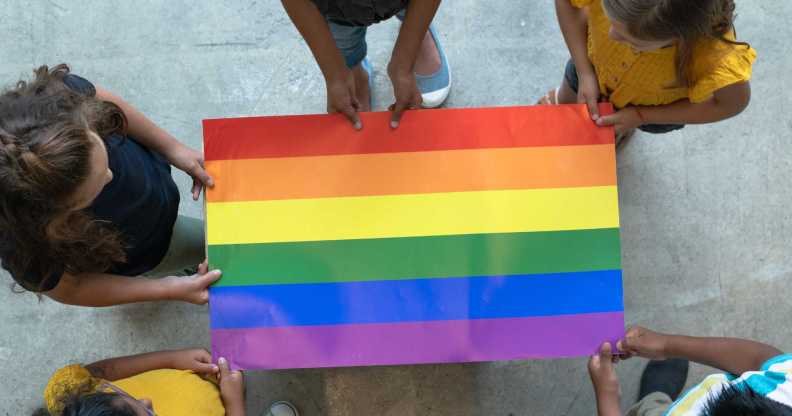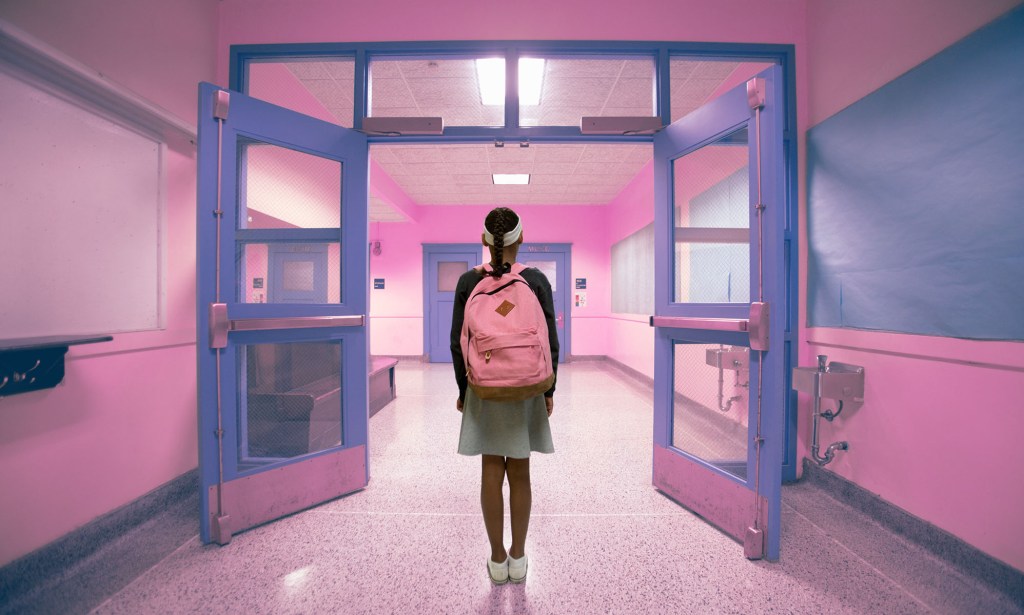Almost half of LGBTQ+ youth feel unsafe at school, research finds

(Getty Images)
Around half of all LGBTQ+ young people feel unsafe in at least one school setting, according to a new report that also revealed the importance of affirmation for trans youth at home.
A new report from LGBTQ+ civil rights non-profit the Human Rights Campaign (HRC) reveals that 46.1 per cent of young people in the US feel unsafe at school, while trans and gender-expansive youth are even more likely to feel unsafe at school, with the figure rising to 54.9 per cent.
The report, released in partnership with the University of Connecticut, examines data gathered in 2022 from 13,000 LGBTQ+ youth across the US, aged 13-18.
It delved into the experiences of LGBTQ+ youth at home and school, as well as their mental health, sexual and gender identity development, and hopes, fears and dreams for the future.
The findings paint a picture of youth who are proud to be queer, but still face discrimination and live in fear.
At school, LGBTQ+ youth feel most unsafe in bathrooms and locker rooms – places which have become a bitter battleground over transgender rights in particular over recent years.

It is perhaps unsurprising that schools are not always places of safety for LGBTQ+ young people, with Republican-controlled states across the US ruthlessly attacking the rights of queer and trans students.
This month alone has seen public schools in Florida’s Orange County announce new guidance that means trans teachers will be misgendered and students will need parental consent for “any deviation” from their legal name.
The HRC report also found that in the family home, over half (57.4 per cent) of those polled reported experiencing at least one form of parental rejection.
However, there are reasons to be hopeful, as more than six in 10 (63.1 per cent) LGBTQ+ youth say they have experienced at least some form of support from their parents.
Affirmation of correct name and pronouns at home vital for mental health of trans youth
The findings show that for trans and gender-expansive youth, having their correct pronouns and chosen names affirmed at home is vital. Young people who experienced this affirmation more frequently at home were significantly less likely to screen positive for depression and anxiety.
Overall, the report found that 55 per cent of LGBTQ+ youth are likely to have depression, rising to 60 per cent among transgender and gender-expansive young people specifically.
It’s a similar picture for anxiety, with two-thirds (63.5 per cent) of LGBTQ+ youth and (68.2 per cent) of trans and gender-expansive youth screening positive for anxiety respectively.
For the purposes of the report, screening positive for depression is based on the PHQ-2, a widely-used two-question screening tool, which assessed the frequency over the prior two weeks, of the respondent having “little interest or pleasure in doing things” or “feeling down, depressed or hopeless”.
Screening positive for anxiety is based on the GAD-2, which assessed the frequency over the prior two weeks, of the respondent “feeling nervous, anxious, or on edge” and “not being able to stop or control worrying”.
Trans youth face greater risk of mental health problems than their cisgender peers
Research consistently shows that transgender youth are much more at risk of developing mental health issues than their cisgender peers.
One study, published by researchers at the University of Melbourne in 2022, found that transgender children are at least three times as likely as their cisgender peers to experience depression, anxiety and neurodevelopmental disorders including ADHD.
It also found that transgender children as young as nine years old are also nearly six times as likely to experience suicidal thoughts.
The vast majority of young people are proud to be part of the LGBTQ+ community
Despite some worrying results, the HRC report also found that a vast majority (90 per cent) of young people are proud to be part of the LGBTQ+ community.
This was slightly higher (92 per cent) for transgender and gender-expansive youth.
Still, pride didn’t detract from their fears of what they may face in adult life. Around two-thirds (69.2 per cent) of LGBTQ+ youth said they are afraid they will be discriminated against in their future career due to their LGBTQ+ identity.
“This report underscores the complex feelings held by LGBTQ+ youth around the country,” said Shoshana K Goldberg, director of public education and R=research at the Human Rights Campaign.
While virtually all LGBTQ+ youth are out and proud, she added: “Many are still lacking the support and affirmation they need, leading them to experience depression and anxiety, and to feel unsafe at school and fearful for their future.”
Looking at how the young people’s emotional well-being improved when they felt safe and accepted, Goldberg said: “It is our responsibility to ensure that we lift up these young people and make sure they know they are valued, loved, and that they are not alone.”
How did this story make you feel?

